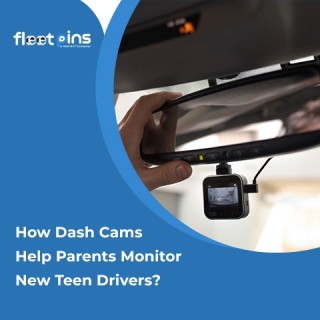
- On 2024-07-16
Things to Consider Before Buying a Dash Cam | Ultimate Guide
Dash cams, short for dashboard cameras, are small recording devices mounted on your car's dashboard or windshield. They record everything that happens on the road, providing crucial evidence in the event of an accident, road rage incident, or even a parking mishap. With the increasing number of vehicles on the road and the unpredictable nature of driving, dash cams have become a popular accessory for motorists worldwide. But before you rush out to buy one, there are several factors you need to consider to ensure you get the best dash cam for your needs.
Why Your Fleet Needs a Dash Cam
There are numerous reasons to invest in a dash cam. Firstly, it provides a reliable eyewitness account in the event of an accident. Insurance claims and police reports can be complicated, and having video evidence can simplify the process significantly. Secondly, dash cams can capture instances of reckless driving or road rage, which can be useful for law enforcement.
Thirdly, they offer protection against fraudulent claims. In some areas, scammers deliberately cause accidents to claim insurance money, and a dash cam can provide evidence to dispute such claims. Lastly, dash cams can also capture unexpected events, such as meteor showers or unusual animal encounters, making them useful for more than just security purposes.
Things to Consider Before Buying a Dash Cam
Let’s see what to look for when buying a dash cam
Price and Budget
The price of dash cams can vary significantly, from budget models under $50 to high-end units costing several hundred dollars. It's important to set a budget that suits your needs and stick to it. Cheaper models might lack certain features, but they can still provide basic recording functions.
Conversely, more expensive models often come with advanced features like higher resolution, GPS tracking, and better night vision. Determine which features are essential for you and choose a dash cam that offers the best value within your budget.
Video Clarity
Image quality is a crucial factor when selecting a dash cam. The primary purpose of a dash cam is to record clear and detailed footage. Look for cameras that offer at least 1080p Full HD resolution. Some high-end models offer 4K resolution, providing even sharper images.
Additionally, consider the camera's frame rate; 30 frames per second (fps) is standard, but 60 fps can offer smoother video playback. A dash cam with good image quality ensures that you can see important details like license plates and road signs, even in challenging conditions.
Power Source
Most dash cams are powered through the car's cigarette lighter socket or a dedicated hardwire kit. However, they usually come with a built-in battery or capacitor to provide power when the car is off. Capacitors are generally more reliable and durable, especially in extreme temperatures, but they offer shorter recording times than batteries. If you need extended recording when your vehicle is parked, look for a model with a good battery life or consider hardwiring your dash cam to the car's power supply.
Storage Capacity
Dash cams record video onto a memory card, usually a microSD card. The amount of storage space you need depends on the resolution and frame rate of your recordings. Higher resolution videos take up more space. Look for a dash cam that supports large capacity microSD cards (at least 64GB or 128GB). Some dash cams also offer loop recording, which means when the memory card is full, the camera will overwrite the oldest footage. This ensures continuous recording without the need to frequently clear the memory card.
Installation Type
The mounting method of a dash cam can affect its usability and stability. The most common methods are suction mounts and adhesive mounts. Suction mounts are easy to install and remove, making them ideal for temporary use or for switching between vehicles.
However, they might not be as stable as adhesive mounts, which provide a more permanent and secure attachment. Consider where you want to place the dash cam and choose a mounting method that suits your needs. Ensure the camera has a wide-angle lens to capture a broad view of the road.
Connectivity options
Wireless connectivity, such as Wi-Fi or Bluetooth, can be a convenient feature in a dash cam. It allows you to connect the dash cam to your smartphone or tablet, making it easier to view and download footage without removing the memory card. Some models offer app integration, providing additional features like live streaming, cloud storage, and remote control. If you value convenience and advanced functionality, look for a dash cam with wireless connectivity options.
GPS Functionality
GPS functionality is a useful feature for a dash cam, as it records your vehicle's speed and location data along with the video footage. This can be invaluable in the event of an accident, providing additional context to the incident. GPS data can also be used to track your routes and monitor driving behavior. Some dash cams have built-in GPS, while others require an external GPS module. If accurate location tracking is important to you, opt for a dash cam with integrated GPS.
Screen Display
Many dash cams come with a built-in display screen, allowing you to view the footage directly on the device. This can be useful for checking the camera's angle, reviewing recorded footage on the go, and adjusting settings without needing a computer or smartphone. Displays vary in size, but even a small screen can be helpful for basic operations. However, keep in mind that a larger display may make the dash cam bulkier and more noticeable.
Additional Features
Some dash cams come with additional features that can enhance their functionality. These can include night vision, which improves recording quality in low-light conditions; parking mode, which records footage when the vehicle is parked and detects motion or impacts; and dual-channel recording, which captures video from both the front and rear of the vehicle. Consider what extra features might be useful for your specific needs and look for a dash cam that offers them.
Conclusion
Choosing the right dash cam involves considering various factors to ensure you get the best device for your needs. From cost and image quality to mounting methods and additional features, each aspect plays a crucial role in the overall performance and usability of the dash cam. By understanding and evaluating these factors, you can make an informed decision and invest in a dash cam that provides peace of mind and reliable evidence on the road.




